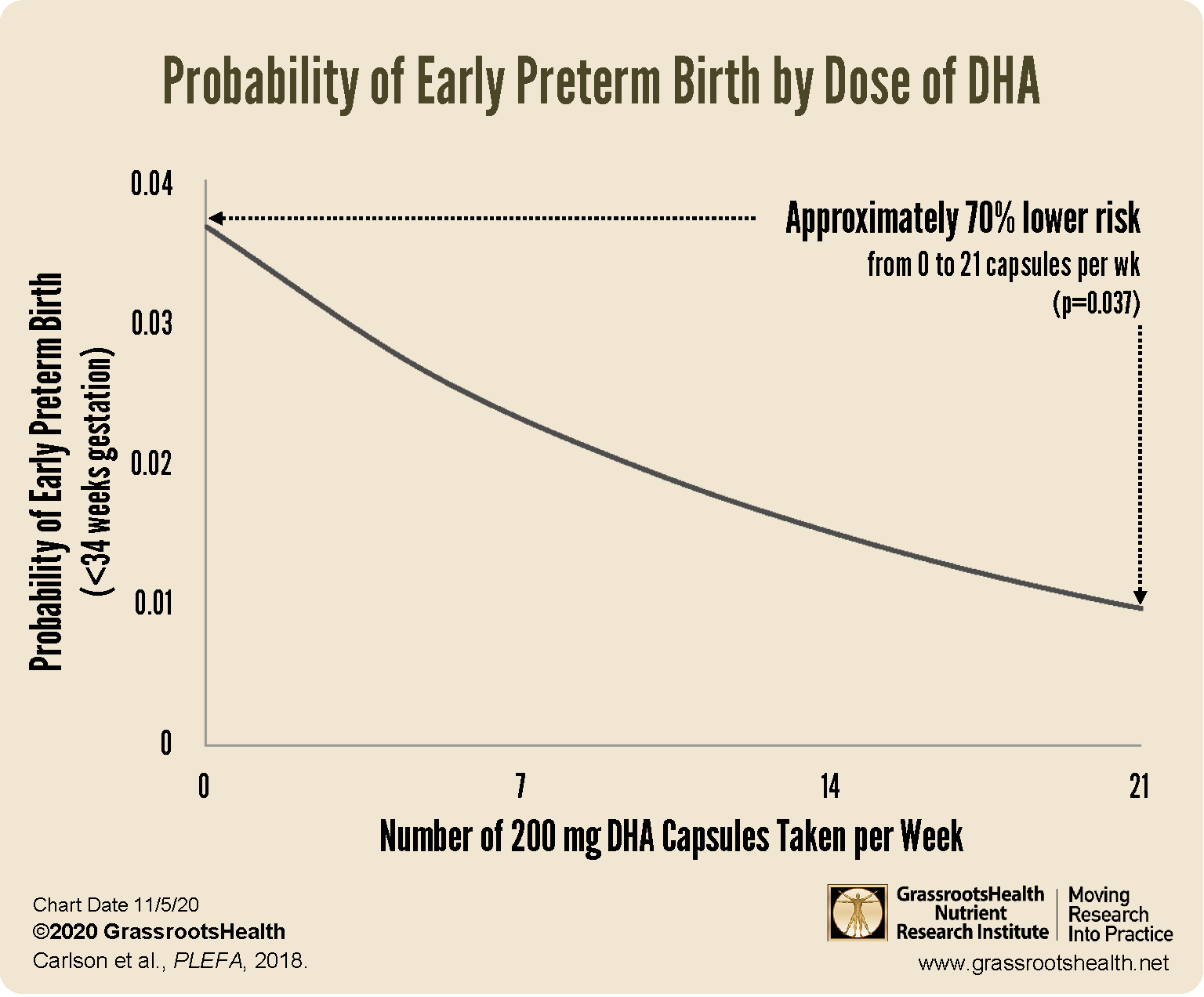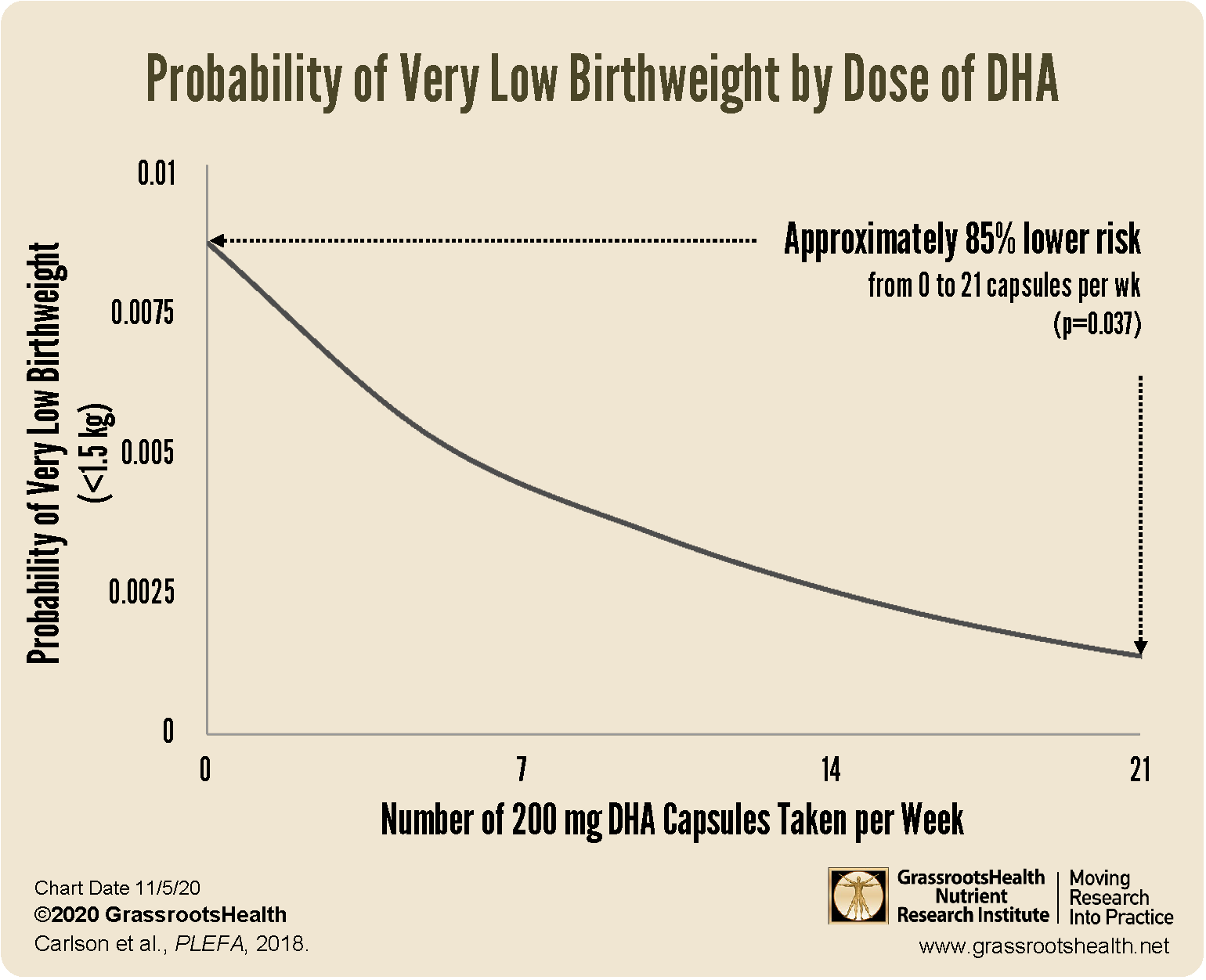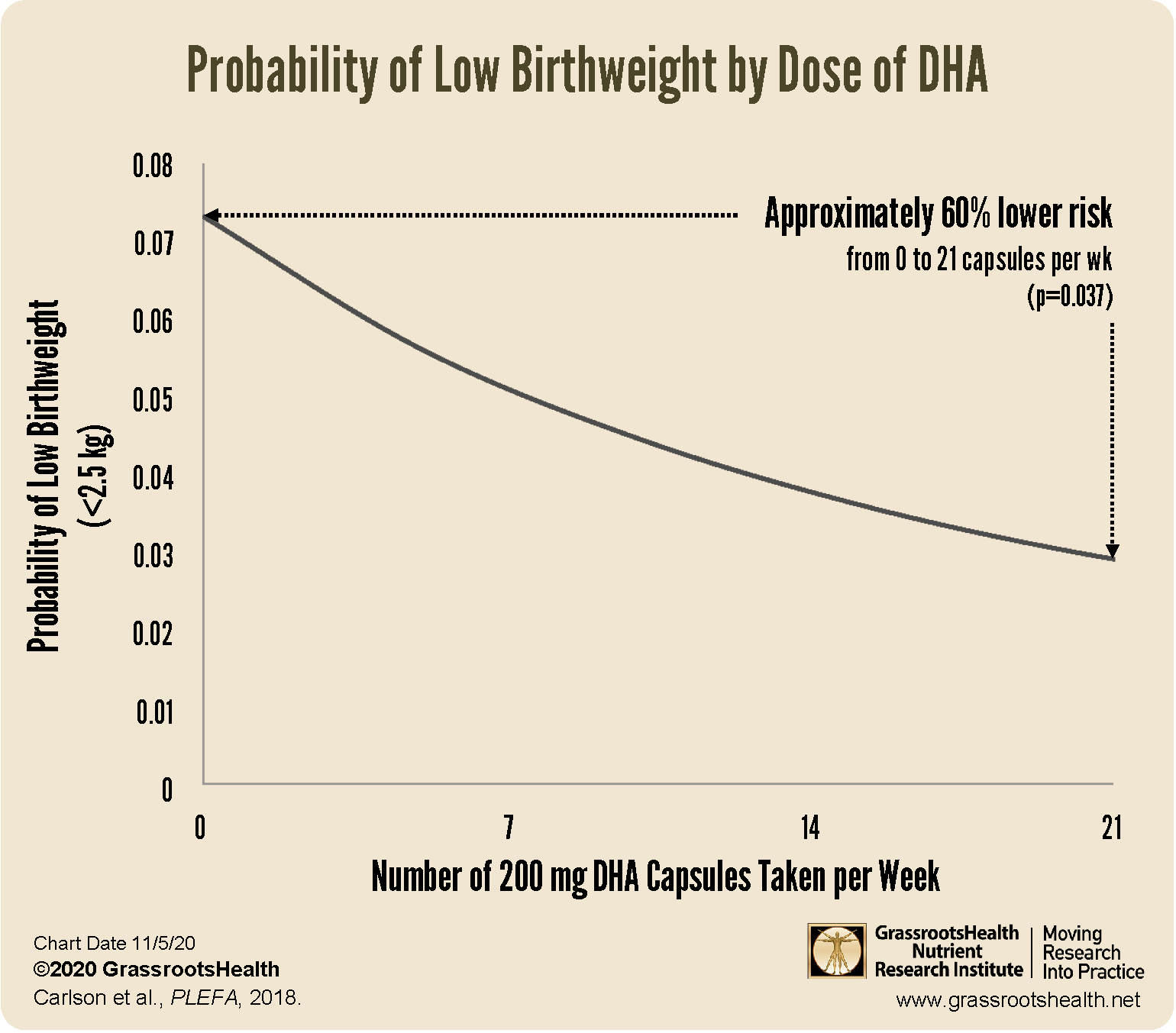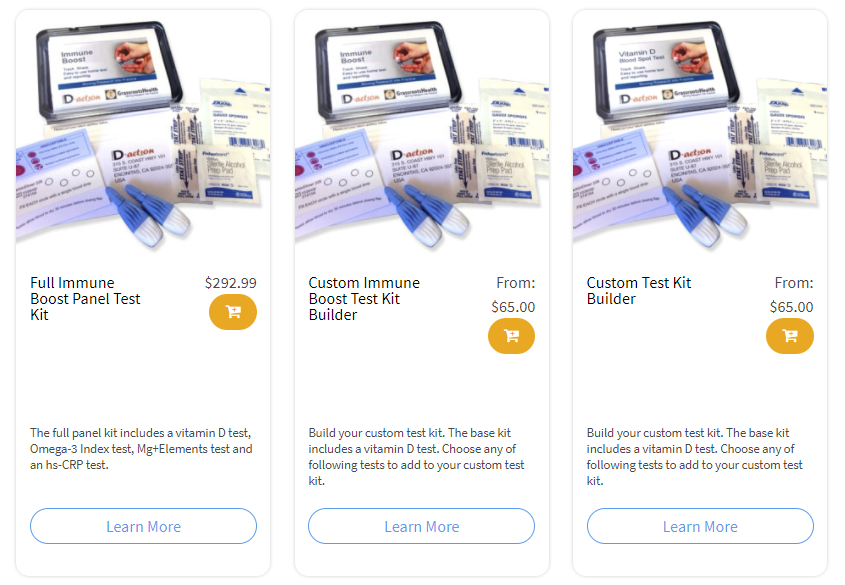Published on November 11, 2020
Study finds the chances of early preterm birth and low birth weight are significantly associated with DHA intake, as well as maternal age and education
 Omega-3 fatty acids are essential to a healthy pregnancy and baby, and studies have shown a relationship between omega-3 intake or status during pregnancy, and outcomes such as infant immunity, time of gestation, birth weight, and even the incidence of postpartum depression. A recent post covered a meta-analysis of six studies on preterm birth and omega-3 supplementation and found a 58% lower risk of early preterm birth (<34 weeks gestation) and a 17% lower risk of any preterm birth (<37 weeks gestation) among pregnant women who took omega-3 supplements.
Omega-3 fatty acids are essential to a healthy pregnancy and baby, and studies have shown a relationship between omega-3 intake or status during pregnancy, and outcomes such as infant immunity, time of gestation, birth weight, and even the incidence of postpartum depression. A recent post covered a meta-analysis of six studies on preterm birth and omega-3 supplementation and found a 58% lower risk of early preterm birth (<34 weeks gestation) and a 17% lower risk of any preterm birth (<37 weeks gestation) among pregnant women who took omega-3 supplements.
Preterm Birth and Low Birth Weight
Carlson et al. looked at data from two previous randomized placebo-controlled trials showing a reduced risk of early preterm birth and very low birth weight among women who supplemented with 600 mg docosahexaenoic acid (DHA) per day during the last half of pregnancy for a secondary analysis to identify any maternal characteristics related to capsule intake (capsules consumed per week), and see if the dose of DHA taken was associated with birth weight and gestation after controlling for those characteristics.
The women in each study had been instructed to consume 3 capsules each day (with each capsule containing 200 mg DHA), for a total of 21 capsules per week. Both maternal age and education were found to influence how many capsules were consumed, with increased compliance significantly associated with increased age and education. In fact, for every 10 year increase in maternal age, there was a median improvement of capsule intake by 1.5 more capsules each week, and for every 4 year increase in education, 1.8 more capsules each week.
Risk Decreased as DHA Intake Increased
The research team also found that as capsule consumption increased, the chances of early preterm birth, very low birth weight, and low birth weight significantly decreased.
In fact, with only 50% compliance (which amounted to approximately 285 mg DHA per day), rates of early preterm birth and very low birth weight were cut nearly in half. Increased compliance was related to continued improvement in gestation time and birth weight. Taking the full amount of DHA, all 21 capsules each week, resulted in an approximate decrease of 70% for early preterm birth, 85% for very low birth weight, and 60% for low birth weight. This effect remained after adjusting for both maternal age and education.
Are You Getting Enough Omega-3s?
GrassrootsHealth offers several testing options to help measure the status of omega-3 and omega-6 fatty acids – the Omega-3 Index, AA:EPA Ratio, and Omega-6:Omega-3 Ratio. Learn more about these tests and the differences between them here. More information on how to improve these test results can be found here.
Using the GrassrootsHealth Custom Kit Builder, you can create a test kit that measures the status of important nutrients (such as vitamin D, omega-3s, and magnesium), as well as your CRP level. Click here to build and order your test kit today – measure your status and take the steps necessary to improve them if needed; make an impact on your health today and for your future! When you know what your levels are, you can determine next steps to take and how much supplementation may be needed if you are not at your target levels.
Concerned specifically about your immune health? See if your immune system might be needing more vitamin D and other immune boosting nutrients by enrolling in the Immune Boost Project with the Full Immune Boost Panel (which includes tests for vitamin D, Omega-3 Index, magnesium, zinc, selenium, copper, and hsCRP), and get 10% off when you use coupon code BoostTen at checkout.
What Does it Take YOU to Get Your D to 40 ng/ml (100 nmol/L)?
Did you know your health could be greatly affected by making sure you have a vitamin D level of at least 40 ng/ml (100 nmol/L)? Help us help you.
STEP 1 – Do you know what your vitamin D level is? If not, be sure to test today to find out.
STEP 2 – Determine your target level. Are you at your target level? Experts recommend a level of at least 40-60 ng/ml (100-150 nmol/L).
STEP 3 – Need to boost your level? Use the D*calculator to see how much vitamin D it may take to reach your target. Opt for the Loading Dose for a quicker boost.
STEP 4 – Optimize how your body absorbs and utilizes vitamin D with co-nutrients and these simple steps.
STEP 5 – Re-Test! This is an important step to make sure you have reached your target level, and to ensure you are not taking too much! Re-testing after 3-4 months is recommended.
STEP 6 – Adjust, Repeat…
Give your immune system the nutrients it needs to support a healthy you and protect yourself from unnecessary diseases, especially COVID-19.
NEWS ALERT
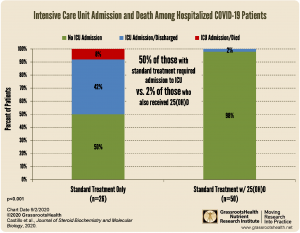 The first Randomized Controlled Trial on vitamin D and COVID-19 has shown a 96% lower risk of ICU admission for those receiving vitamin D (as 25(OH)D to quickly boost vitamin D blood levels) along with the standard treatment, compared to those receiving standard treatment alone.
The first Randomized Controlled Trial on vitamin D and COVID-19 has shown a 96% lower risk of ICU admission for those receiving vitamin D (as 25(OH)D to quickly boost vitamin D blood levels) along with the standard treatment, compared to those receiving standard treatment alone.
These results support many previous observational studies showing a relationship between vitamin D levels and intake and COVID-19 severity.
Review the Latest Nutrient Research for COVID-19
GrassrootsHealth Nutrient Research Institute has launched the new Immune Boost project with the use of our myData-myAnswers nutrient health system that nearly 15,000 people are already using for their health. Specific markers that influence immune health are suggested for testing as part of this project including:
- Vitamin D
- Omega-3 Index
- Essential elements magnesium, selenium, and zinc
- hsCRP
Our goal is to demonstrate how one can use the Nutrient Research Model established by Dr. Robert Heaney to show the effect of vitamin D serum levels of at least 40 ng/ml (100 nmol/L) on risk reduction for all ethnicities in the population. Status and intake of other nutrients will also be analyzed for any type of relationship to immune status and symptom severity. Join the project today!
Please let us know if you’re interested in helping sponsor this project.
Through GrassrootsHealth Nutrient Research Institute, you can also test your essential elements magnesium, copper, zinc and selenium, toxins such as lead, mercury and cadmium, as well as your omega-3 levels, inflammation levels and thyroid stimulating hormone (TSH) level. Find out your levels today! Log on to the test selection page (click the link below) to get your tests and see for yourself if your levels can be improved.
Make sure you track your results before and after, about every 6 months!
Click Here to Access the Test Page
How can I track my nutrient intake and levels over time?
To help you track your supplement use and nutrient levels, GrassrootsHealth has created the Personal Health Nutrient Decision System called
For each specific supplement, you can track what days you take it, how much, and many other details. This will help you know your true supplemental intake and what patterns of use work for you to reach and maintain optimum nutrient levels. Check it out today!


